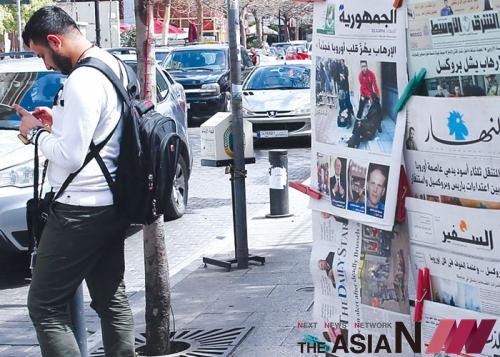레바논의 신문이 사라지고 있다···’언론위기’ 극복 7가지 방안

[아시아엔=기나 할릭 레바논 언론인] 레바논 언론은 스마트폰 등 전자기기와 SNS의 괄목할 만한 성장으로 최대 위기를 맞고 있다. 이런 변화는 신문, 텔레비전으로 대표되는 전통적인 형태의 언론에 부정적인 영향을 미치고 있다. 사람들은 이제 세상에서 일어나는 사건·사고를 접하기 위해 텔레비전이나 신문 대신 스마트폰과 SNS를 활용하고 있다.
신문·방송 등 전통적인 미디어는 존재가치가 줄어들며 독자들 또한 줄어들고 있다. 이는 곧 신문 폐간 및 방송 시청률 하락을 뜻한다. 이에 따라 레바논에선 언론인들의 실직과 감원이 이어지고 있다.
더욱이 레바논 언론들은 최대의 재정 위기를 겪고 있다. 그동안 상당수 레바논 언론은 정치인들과 거대 자본가들을 추종하는 한편 이용당해온 측면도 있다. 언론은 정치세력과 국민과의 화합보다 국론 분열 및 양극화 조장에 앞장서왔다.
물론 국가가 언론을 통제하거나 정부 당국이 언론을 직접 관장하는 것은 아니다. 말하자면 ‘언론의 자유’가 보장되고 있는 셈이다. 이는 레바논 언론의 강점이기도 하다.
문제는 레바논 언론인들이 자신의 의견을 당당하게 표출하지 않는다는 데 있다. 물론 저임금과 안정적인 생활이 보장되지 않는 상황에서 언론인들이 자유롭게 자신의 의견을 피력하는 걸 기대하긴 쉽지 않다.
지금 레바논 언론에 필요한 것은 연합체를 구성해 회사의 압력과 경제적 궁핍에서 벗어나도록 힘을 모아야 한다는 점이다. 그때가 되어서야 비로소 언론 자유를 제대로 구가할 수 있을 것이라고 본다.
레바논 언론은 지금 미디어환경 변화와 재정위기라는 거대한 파도에 마주서 있다. 그럴 수록 언론의 역할과 위치를 재확인하고 새로운 발전방향을 모색해야 한다. 레바논 신문·방송들이 도입·추진하고 있는 대안들은 △웹사이트와 SNS에 집중 △지면 혁신과 뉴스의 속보성 강화 △독자의견·제안을 수렴해 기사작성에 반영 △동영상·사진 등 시각요소 강화 △오프라인 매체 판매에서 온라인 판매로 수익구조 전환 △여론조사 통해 대중 의견 최대한 수렴 등이다.
Lebanese media crisis between electronic media and the decline of funding
Ghina Halik
The Lebanese media is facing a big crisis after the remarkable development of the electronic media and social communication. This rapid development was reflected negatively on the traditional media so now it needs more effort to prove its role in delivering news to citizen.
People used to watch the news and read the newspaper in order to be updated on what’s going on around them, now the news comes to them wherever they are thanks to smart phones and social media.
The traditional media lost its value and audience because of the spread of smartphones and social media applications which caused many important newspaper companies to shut down so a lot of journalists lost their jobs. Many televisions reduced their staff because of the decrease of their audience which reflected negatively on its production and performance.
The Lebanese media is going through rough crisis in terms of funding which reflected on its performance, it became limited by the funder. And it has become far from moderation, and tends to extremism.
Media has become a follower of politicians and financiers and became a tool for them. It became an extension and a reflection of the division of the country, and the contradictory political positions instead of uniting parties and citizen and criticizing extremism.
Regarding to monitoring and laws, we cannot say that there is a real control over the media in Lebanon and because the political authorities does not exercise a supervisory role directly and it is not necessarily a negative thing since the Lebanese media is free. And this is one of the strengths of the Lebanese media.
The real problem is that the Lebanese reporter cannot express his opinion most of the time because he is being told what to say. But of course there are always reporters who still say what they want no matter what but this rarely happens. In addition to that the salaries and benefits available to journalists are very little so that they could be free.
Therefore I believe that there should be a large project information in Lebanon beginning with building media trade unions to achieve the guarantees of the Journalist, at least social guarantees and pensionable terms to allow journalists to think freely and to be free from economic pressures and the pressure of the Employer.
The Lebanese media is now facing a big challenge to prove itself and to maintain its position, the media is trying by all means to develop and renew its resources and giving the public prominent issues to keep the interest of its remaining followers. Therefore most newspapers and televisions are following a new methodology:
?Focusing on websites and social media means.
?Renewing its pages and using quick news services.
?Arranging a place for its readers to participate and get their opinions and suggestion.
?Adopting a video news program prepared in advance for the electronic sites journals and magazines.
?Focusing on images more than text.
?Adopting mail subscription system instead of expensive paper subscription.
?Activating the role of statistics and opinions of the public.





